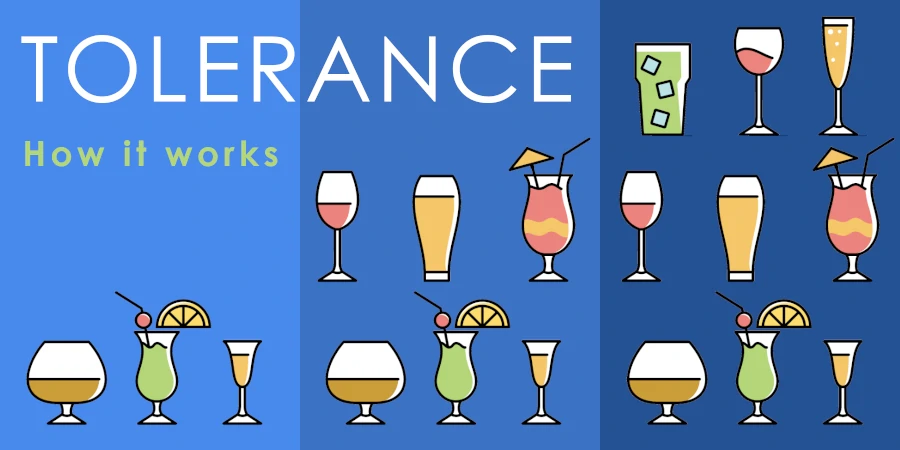Drug tolerance describes an individual’s reduced reaction to a drug following its repeated use.
With repeated use, the body adapts to the continual presence of the substance. For example, when alcohol or cocaine is used for a long time, a higher volume dose must be taken to achieve the same effect.
Tolerance usually develops because the body wants to get rid of toxic substances as efficiently as possible, which is done by speeding up the drug’s metabolism. For example, increased amounts of the ‘alcohol dehydrogenase’ liver enzymes will be produced to counteract increasing alcohol consumption. Also, tolerance occurs because the number of sites (cell receptors) the drug attaches to, or the strength of the bond (affinity) between the receptor and drug decreases.

Tolerance, dependence or addiction?
Scientists still don’t fully understand exactly why tolerance occurs in some people. With tolerance, certain cell receptors in the body that activate when the drug is present stop responding like they once did. Your body might also clear the medication faster.
If someone is dependent on a substance, if the drug isn’t present, or if the dose is suddenly reduced, they might experience withdrawal symptoms.
Depending on the substance, withdrawal symptoms can be mild or severe. Here are some examples of withdrawal symptoms:
- Nausea or vomiting
- Insomnia
- Tremors or shakes
- Anxiety
- Psychosis
- Seizures
If your body is dependent on a drug, it’s important not abruptly to stop taking it. Your doctor can put you on a schedule to gradually ease off the drug to avoid withdrawal symptoms. They can also recommend resources like rehabilitation or therapy to support you.
Addiction involves changes in brain activity, such as the neurotransmitter dopamine is repeatedly triggered and increases drug cravings. Despite the potential for harm, someone with a drug addiction will continue to abuse a substance.
What are the risks of drug tolerance?
Risks from developing tolerance can include:
- More side effects from an increased dose.
- Potential overdose
- Addiction
- Relapse or flare-up of the condition
Medication types and tolerance
Examples of drugs you can become tolerant of are:
Anti-depressants: sometimes, the effects of anti-depressants can wear off, which can sometimes lead to patients taking higher doses to curb their depression. Unfortunately, this can lead to an anti-depressant addiction.
Antibiotics: weakened effects and drug resistance can occur.
Anxiolytics: tolerance and dependence may occur. For example, after regular use for insomnia for a longer period, some sleeping pills, such as benzodiazepines or benzodiazepine agonists, such as zolpidem or zopiclone, may stop working as you build a tolerance to the medication. It’s theorised that the medication’s effects on GABA is the root cause.
Drugs for Cancer: multi-drug tolerance can develop sometimes, but a ‘drug holiday’ can sometimes reset effectiveness.
Reducing drug tolerance
Your doctor might slowly stop the medication and restart it after a break. This gives your body a chance to reset. It doesn’t always work long-term, but it can be one option to try.


